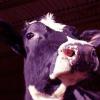I think it's fitting that we kick this topic off with the study that started it all by introducing the world to the concept of 'prebiotics'. =)
I've had excellent results so far with 4tbsp/day of Bob's Red Mill Unmodified Potato Starch http://www.amazon.co...013JOKBC/ and I'd like to give huge props to Joe Cohen, Richard Nikoley, and Tim Steele for their contributions.
Joe: http://selfhacked.co...or-weight-loss/
Richard and Tim: http://freetheanimal...er-newbies.html
Mr. Heisenberg is also doing some excellent work on this subject:
http://mrheisenbug.w...brain-on-fiber/
http://mrheisenbug.w...nges-the-brain/
http://www.ncbi.nlm..../pubmed/7782892
J Nutr. 1995 Jun;125(6):1401-12.
Dietary modulation of the human colonic microbiota: introducing the concept of prebiotics.
Gibson GR, Roberfroid MB.
Author information
Abstract
Because the human gut microbiota can play a major role in host health, there is currently some interest in the manipulation of the composition of the gut flora towards a potentially more remedial community. Attempts have been made to increase bacterial groups such as Bifidobacterium and Lactobacillus that are perceived as exerting health-promoting properties. Probiotics, defined as microbial food supplements that beneficially affect the host by improving its intestinal microbial balance, have been used to change the composition of colonic microbiota. However, such changes may be transient, and the implantation of exogenous bacteria therefore becomes limited. In contrast, prebiotics are nondigestible food ingredients that beneficially affect the host by selectively stimulating the growth and/or activity of one or a limited number of bacterial species already resident in the colon, and thus attempt to improve host health. Intake of prebiotics can significantly modulate the colonic microbiota by increasing the number of specific bacteria and thus changing the composition of the microbiota. Nondigestible oligosaccharides in general, and fructooligosaccharides in particular, are prebiotics. They have been shown to stimulate the growth of endogenous bifidobacteria, which, after a short feeding period, become predominant in human feces. Moreover, these prebiotics modulate lipid metabolism, most likely via fermentation products. By combining the rationale of pro- and prebiotics, the concept of synbiotics is proposed to characterize some colonic foods with interesting nutritional properties that make these compounds candidates for classification as health-enhancing functional food ingredients.
Here's a recent study on the role of prebiotics in upregulating BDNF, NMDA receptors, and D-serine in rats.
http://www.ncbi.nlm....pubmed/24140431
Neurochem Int. 2013 Dec;63(8):756-64. doi: 10.1016/j.neuint.2013.10.006. Epub 2013 Oct 16.
Prebiotic feeding elevates central brain derived neurotrophic factor, N-methyl-D-aspartate receptor subunits and D-serine.
Savignac HM, Corona G, Mills H, Chen L, Spencer JP, Tzortzis G, Burnet PW.
Author information
Abstract
The influence of the gut microbiota on brain chemistry has been convincingly demonstrated in rodents. In the absence of gut bacteria, the central expression of brain derived neurotropic factor, (BDNF), and N-methyl-d-aspartate receptor (NMDAR) subunits are reduced, whereas, oral probiotics increase brain BDNF, and impart significant anxiolytic effects. We tested whether prebiotic compounds, which increase intrinsic enteric microbiota, also affected brain BDNF and NMDARs. In addition, we examined whether plasma from prebiotic treated rats released BDNF from human SH-SY5Y neuroblastoma cells, to provide an initial indication of mechanism of action. Rats were gavaged with fructo-oligosaccharides (FOS), galacto-oligosaccharides (GOS) or water for five weeks, prior to measurements of brain BDNF, NMDAR subunits and amino acids associated with glutamate neurotransmission (glutamate, glutamine, and serine and alanine enantiomers). Prebiotics increased hippocampal BDNF and NR1 subunit expression relative to controls. The intake of GOS also increased hippocampal NR2A subunits, and frontal cortex NR1 and d-serine. Prebiotics did not alter glutamate, glutamine, l-serine, l-alanine or d-alanine concentrations in the brain, though GOSfeeding raised plasma d-alanine. Elevated levels of plasma peptide YY (PYY) after GOS intake was observed. Plasma from GOS rats increased the release of BDNF from SH-SY5Y cells, but not in the presence of PYY antisera. The addition of synthetic PYY to SH-SY5Y cell cultures, also elevated BDNF secretion. We conclude that prebiotic-mediated proliferation of gut microbiota in rats, like probiotics, increases brain BDNF expression, possibly through the involvement of gut hormones. The effect of GOS on components of central NMDAR signalling was greater than FOS, and may reflect the proliferative potency of GOS on microbiota. Our data therefore, provide a sound basis to further investigate the utility of prebiotics in the maintenance of brain health and adjunctive treatment of neuropsychiatric disorders.
Here's a 6 minute TED talk that gives a very nice overview of the topic. Enjoy!
Edited by lostfalco, 01 February 2014 - 09:09 PM.




























































